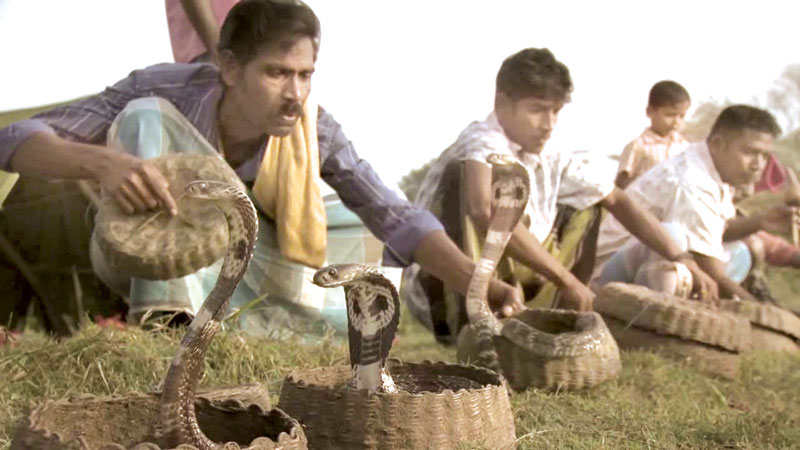Ahikuntaks as gypsies are called in Sri Lanka have close affinity with their counterparts who speak Telungu language living in South India. These wondering tribes living in small groups concentrate mostly in the dry zone of Sri Lanka.
Ahikuntaka families keep on moving from place to place living in the open air. They sleep in the night inside low palm leaf makeshift huts which could be carried on the backs of donkeys when they move to another selected spot far away.
They always prefer to camp close to a water way to obtain there supply of water for drinking as well as for washing and also bathing.
These wanderers move taking their belongings on the backs of the donkeys, Their companions. Men, women, children, dogs, monkeys and Cobras which they carry in round woven boxes- especially made with safety closed lids. Ahinkuntakas always go the places where other groups camp annually.Ahinkuntakas begin their journey in the country in the wee hours of the morning to another selected place to stay for another spell. Their belief is that they always stay at a place for seven days raises a sense of curiosity in us.
After they have camped the men and women go in diverse in search of money and goods. This they do with day break. Women very often specialize in fortune reading by looking at the palm of the client who is curious to know what is in store for him according to his stars.
The readings are always impressive and captivating especially when fortunes are showered on the gullible listeners! At times a woman makes her predictions with a small bird inside a small cage placed on the ground. She gently opens the door of the cage to place a palm leaf on which writings are made. This small bird picks up a leaf of the palm leaf and then looking at the palm leaf the Ahikuntaka women goes on to describe the readings. The women describes the readings that are always impressive and captivating especially when fortunes are showered on the ears of the gullible listeners!
Ahikuntakas are familiar at village fairs where people gather to make these weekly purchases. One can observe men with this monkeys and cobras who instantly draw the attentions of the passers by.
Among this celebrations marriage ceremony takes a prominent place in this lives, On the day of the wedding huts are erected made out of palm leaves one for the bride and other for the groom close to each other.
When the time arises the woman walks out in all her finery. She wears a bright sari and jacket and is decked with silver jewelry and bead ornaments. A veil of which cloth is thrown purdah way over her head. The brides mother prepares her daughter for the wedding ceremony, She adorns her with heavy silver bangles on arms and wrists. Strings of colorful beads go round her neck and more jewelry glitters on her nose, ears and hair.
Inside this hut the bridegroom prepares to meet his bride wearing a colorful sarong. In the meantime the wise women of the bride sings sensuous love songs while preparations are made elaborately for the marriage ceremony. The nuptial knot is tied by bringing the brides and bridegrooms two little fingers together at the same time the ends of saris as tied in the presence of the relatives.
The groom harps a single leaf of betel and some areca nuts in his hands. The guests who are served liquor then begin to dance to the accompaniment of the tappu (The traditional hand drum).
The officiating elders recite hymns invoking the blessings on the newly married couple. The dowry of a donkey is made to the groom as an essential part of the life of them to carry his possessions on its back. The couple is then given a portion of the intoxicating drink and the newly wedded couple is dragged into the party of dancers. The groom with his coy bride dances to the beat of the thappu and to the tune of the snake charmers flute.
After the ceremony which lasts three hours the bride and groom are conducted to the nearby water pool in order to offer prayers and gifts to the deities, Akkuntakas believe that the waters edge is the ideal place to communicate with the supernatural, The offerings consist of a large brass vessel full of water a few betel leaves, A split coconut and a half burnt log. As the couple begin to offer prays to the deities. The guests and family members take their leave and the couple is left to themselves.



Add new comment